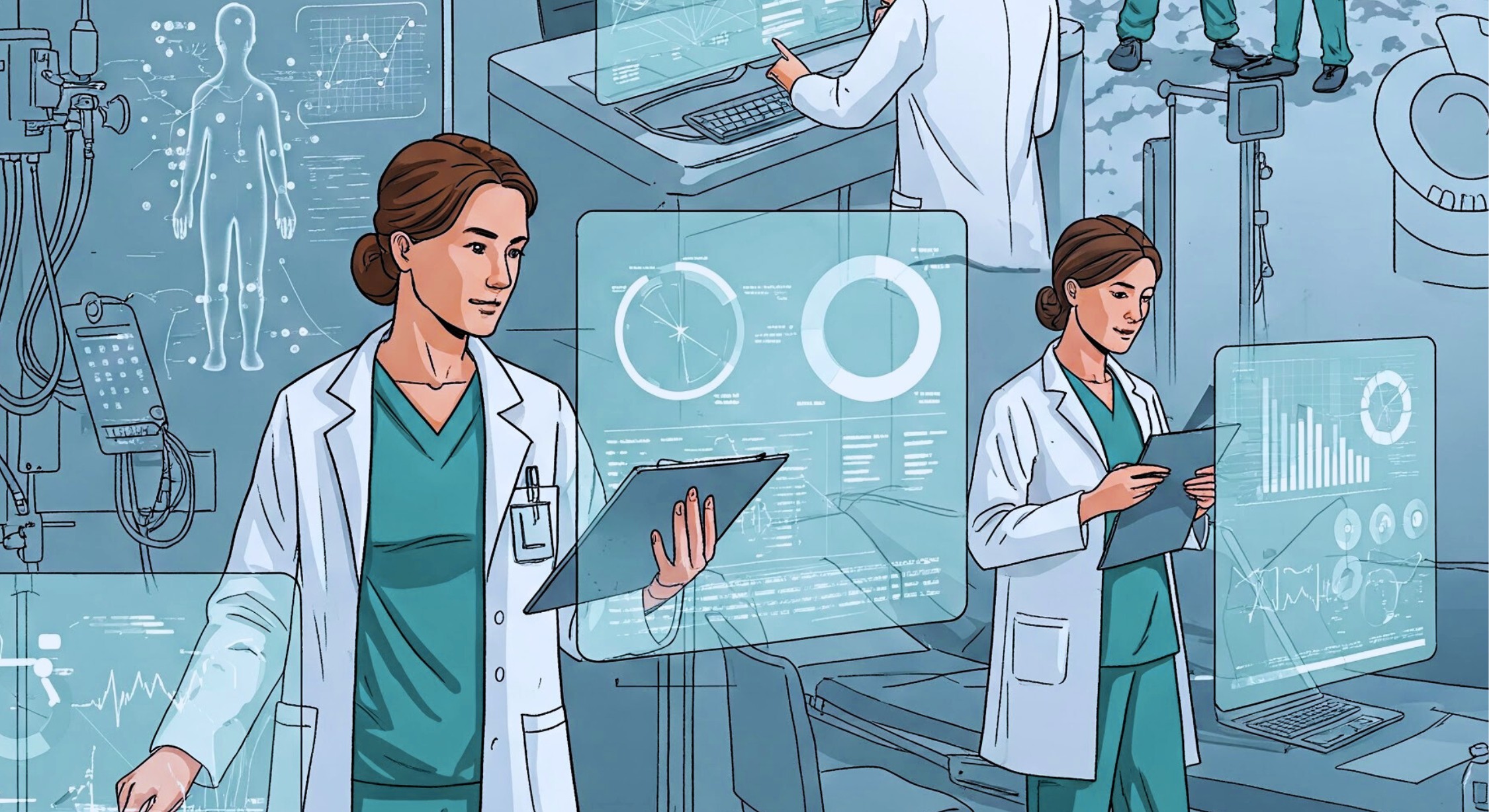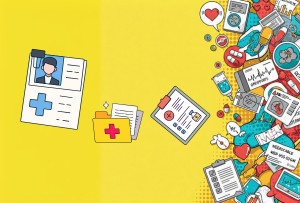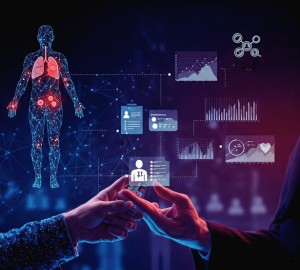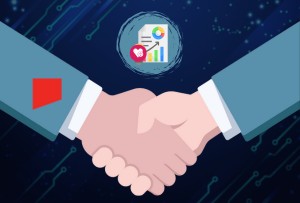Experion builds the digital foundations that support modern healthcare by integrating real-time analytics, predictive tools, and connected systems that enable better decision making.
Across the industry, there’s a clear shift toward using data not just for documentation but to guide clinical and operational choices. Whether it’s identifying conditions earlier or managing hospital workflows more efficiently, data is reshaping how care is delivered. In this environment, data-driven decision making is no longer optional. It’s becoming essential to achieving better outcomes and smarter planning.
This evolution reflects more than just the use of digital tools. It marks a shift in how healthcare professionals think, act, and solve problems. With access to real-time analytics, predictive models, and patient-specific information, decisions are now more precise, timely, and effective. In this blog, we dive into what makes data-driven healthcare a game-changer and why it is shaping the future of modern medicine.
What is Data Driven Decision Making in Healthcare?

Data driven decision making in healthcare refers to the practice of using collected, processed, and analyzed data to make informed decisions that impact both clinical and operational outcomes. It is about replacing guesswork, isolated expertise, or tradition with evidence-based insights that come from structured analysis.
Instead of relying solely on intuition, clinicians and administrators now have access to thousands of data points that provide clarity and direction. Whether it’s designing a treatment plan, improving patient flow, or planning resource allocation, data-driven healthcare solutions enable choices that are smarter, faster, and more consistent.
Traditional vs. Data-Driven Decision Models
|
Aspect |
Traditional Decision-Making |
Data-Driven Decision Making |
|
Basis for Decisions |
Personal expertise, intuition, and recent memory | Structured datasets, predictive models, and real-time dashboards |
| Risk of Bias | Higher risk due to subjective judgment and limited experience |
Reduced bias through evidence-based insights and comprehensive data analysis |
|
Visibility into Trends |
Limited to individual experience and anecdotal evidence | Enables identification of patterns and correlations across large patient populations |
|
Example Scenario |
A physician chooses a treatment based on a few memorable cases |
A treatment plan is selected based on data from thousands of similar cases |
|
Operational Use Case |
Staffing decisions may rely on static schedules or assumptions |
Historical data helps forecast ER demand and optimize staffing in advance |
|
Outcome Consistency |
May vary across providers and situations |
More standardized and optimized outcomes across departments |
| Overall Benefit | Relies on valuable experience but lacks scalability and consistency |
Promotes objective, scalable, and proactive decision-making |
The Importance of Data Analytics and Data-Driven Strategy in Healthcare

As healthcare systems become more complex, the need for precision, personalization, and operational efficiency grows. Data analytics and data-driven strategies are at the heart of this transformation, creating a smarter, more responsive ecosystem.
Real-Time Insights for Clinical Decision Support
- Clinicians now have access to integrated datasets from Electronic Health Records (EHRs), lab systems, and wearable devices, allowing for faster and more informed decisions.
- Machine learning models and clinical decision support systems analyze real-time data to surface alerts and recommendations.
- Examples include early warnings for drug interactions or sepsis, which help clinicians take immediate, life-saving actions.
- These tools support the development of personalized treatment plans and improve diagnostic accuracy.
- Real-time analytics lead to timely interventions, reduced complications, and a shift from reactive to proactive healthcare.
Enhancing Hospital Operations, Patient Engagement, and Care Coordination
- Administrators use real-time and historical data to:
- Monitor patient flow
- Manage bed occupancy
- Predict peak periods
- Adjust staffing levels
- These operational improvements reduce wait times, optimize resource use, and cut costs.
- Data-driven healthcare solutions also enable:
- Personalized communication
- Medication reminders
- Tailored health education for patients
- Improved patient engagement builds stronger relationships and supports better health outcomes.
- Data analytics allows for seamless tracking of a patient’s journey across different care settings, minimizing:
- Redundant testing
- Missed follow-ups
- Communication breakdowns
- As a result, patients receive consistent care and better support through transitions, such as discharge or referrals.
Predictive Analytics for Readmissions and Chronic Disease Management
Reducing Readmissions:
- Predictive models analyze factors such as:
- Prior hospital admissions
- Existing comorbidities
- Discharge instructions
- Socioeconomic conditions
- Patients at high risk of readmission are flagged early.
- Targeted interventions include:
- Follow-up care plans
- Medication reviews
- Home health visits or remote monitoring
- These efforts reduce unnecessary readmissions and lower associated costs.
Managing Chronic Diseases:
- Data analysis in health care supports better control of chronic illnesses like diabetes, asthma, and heart disease.
- Wearables and remote monitoring devices provide real-time physiological data (e.g., glucose, BP, oxygen levels).
- Predictive insights allow:
- Early detection of disease flare-ups
- Lifestyle coaching
- Adjustments in medication or therapy
- This proactive model improves long-term health outcomes and reduces the burden on healthcare resources.
Data Analysis in Health Care: Sources and Types of Data

Effective data-driven decision making in healthcare relies on analyzing data that is both diverse and rich in detail. From clinical notes to wearable device metrics, the types of healthcare data available today are varied, complex, and incredibly powerful when integrated and interpreted correctly.
- Electronic Health Records (EHRs)
Electronic Health Records are a cornerstone of data analytics in healthcare. These digital systems capture a vast range of patient information, including demographics, medical histories, diagnoses, medications, allergies, immunizations, lab results, treatment plans, and discharge summaries. By analyzing data from EHRs, healthcare providers can identify patterns across populations, monitor treatment effectiveness, and recognize trends in public health. These insights serve as the foundation for more accurate diagnoses and informed clinical decision-making.
- Medical Imaging, Lab Reports, and Genomics
Diagnostic data provides another layer of essential information. Medical imaging includes X-rays, MRIs, CT scans, and ultrasounds, all of which offer visual clues that support clinical assessments. Lab reports, on the other hand, quantify a patient’s physiological condition through tests on blood, urine, and tissue samples. Genomic data introduces a new dimension of personalized care by offering insights into an individual’s genetic predisposition to diseases. These data types are vital to building data driven healthcare solutions that support early detection, tailored treatments, and predictive diagnostics.
- Wearable Device Data and Remote Monitoring Systems
With the rise of health tech, wearable devices and remote monitoring systems have emerged as key contributors to data analysis in health care. These tools provide real-time data on heart rate, activity levels, sleep patterns, blood oxygen, and glucose levels. This stream of continuous physiological data allows providers to monitor patients outside of clinical settings and intervene early in case of anomalies. For chronic conditions, this proactive approach enables better disease management and helps reduce emergency visits and hospitalizations.
- Claims, Billing, and Insurance Data
Administrative data also plays an important role in data driven healthcare. Claims and billing records reflect healthcare utilization, treatment costs, and reimbursement patterns. Insurance data offers demographic insights, coverage details, and policy-related information. When analyzed strategically, this data helps identify trends in healthcare spending, detect fraudulent claims, streamline revenue cycles, and guide decisions related to healthcare policy and access. These financial and operational insights complement clinical data, making them indispensable to a comprehensive data driven strategy.
Building a Data-Driven Healthcare Ecosystem
Turning raw data into meaningful actions requires more than just collecting information. To truly enable data-driven decision making, healthcare systems must build an ecosystem where data flows smoothly, securely, and intelligently across every level of care.
Essential Infrastructure
A strong digital infrastructure lays the foundation for advanced data-driven healthcare solutions.
- Cloud Computing
Cloud platforms offer secure, scalable environments to store and process the enormous volumes of data generated daily. Their flexibility allows healthcare institutions to scale up analytics efforts without the limitations of on-premise storage. Cloud systems also support collaboration and remote access, which are crucial in modern, distributed healthcare networks. - EHR Integration
For data analytics in healthcare to be effective, interoperability is essential. Data should flow seamlessly across systems without barriers or interruptions. Achieving seamless EHR integration means adopting standardized formats, shared protocols, and collaborative data exchange models. Through effective integration, healthcare providers can establish a comprehensive view of a patient’s health, enabling more coordinated and efficient care delivery. - Artificial Intelligence and Machine Learning
AI and machine learning tools empower healthcare systems to uncover patterns that would be invisible to human analysts. These technologies can support early diagnosis, automate administrative processes, predict patient outcomes, and recommend evidence-based interventions. Their role is central to scaling data driven strategies across departments.
Fostering a Data-Centric Culture Through Leadership
Technology alone is not enough. Healthcare leaders must champion a data-driven mindset. This includes setting clear goals for data utilization, investing in tools and training, and embedding data driven decision making into the organization’s core values. Leadership involvement ensures accountability, direction, and sustained progress in adopting data-informed practices.
Training and Upskilling Healthcare Professionals
Healthcare teams need more than clinical expertise to succeed in a data-rich environment. From doctors and nurses to administrative staff and technicians, everyone must develop a degree of data literacy. Training programs that teach how to interpret dashboards, understand predictive models, and use analytical tools are essential. This investment in people ensures that data insights are not just available, but also understood and acted upon with confidence.
Implementing Strong Data Governance and Security Frameworks
Trust is the foundation of data-driven healthcare. Patients must be confident that their sensitive data is protected. Organizations must build governance frameworks that define clear data standards, control access, maintain data quality, and enforce security protocols. Compliance with local and international regulations, such as HIPAA, is non-negotiable. A secure and ethical approach to data management enables the growth of data-driven healthcare solutions while preserving public trust.
Applications of Data-Driven Healthcare Solutions

The true power of data-driven healthcare solutions lies in their ability to translate raw information into meaningful action. Across clinical, operational, and public health domains, data analytics in healthcare is reshaping how care is delivered, how resources are used, and how outcomes are improved. Below are some of the most impactful applications of data-driven decision making in healthcare.
Population Health Management
Data-driven healthcare strategies are essential for understanding and managing the health of entire communities. By examining aggregated data from sources like electronic health records (EHRs), insurance claims, and public health databases, healthcare organizations can uncover trends, identify high-risk populations, and detect emerging health threats.
This data-driven approach empowers public health agencies to develop targeted prevention initiatives and allocate resources with greater precision and impact. For example, a spike in diabetes cases in a specific region can prompt community-level education campaigns and increase access to early screenings. With such data-driven strategies, healthcare systems can reduce disparities, improve health equity, and take proactive steps in managing chronic diseases and potential outbreaks.
Early Disease Detection and Personalized Treatment Plans
One of the most promising outcomes of data analytics in healthcare is the ability to detect diseases at earlier stages. Machine learning models can uncover patterns in patient data that may indicate the presence of conditions such as cancer, heart disease, or Alzheimer’s, often before symptoms become visible or detectable through standard diagnostics.
When this data is combined with insights from genomics, lifestyle information, and treatment history, healthcare providers can build highly individualized care plans. This personalized approach ensures that each patient receives treatments tailored to their unique profile, improving effectiveness and reducing unnecessary side effects. It is a key element of precision medicine and a strong example of how data driven decision making can enhance clinical outcomes.
Resource Optimization and Staff Allocation
In today’s healthcare environment, resource efficiency is critical. Hospitals and clinics face constant pressure to deliver high-quality care while managing costs and preventing staff burnout. With the help of data analysis in health care, administrators can gain visibility into patterns of patient flow, bed occupancy, equipment use, and length of stay.
This information allows for smarter planning and better allocation of resources. For example, predictive analytics can forecast peak times in the emergency department, enabling hospitals to adjust staffing and reduce wait times. Similarly, analyzing staff availability and workload data supports better shift planning, ensuring that the right professionals are available when needed, improving both patient care and staff well-being.
Enhancing Patient Safety and Reducing Medical Errors
Data driven healthcare solutions also play a key role in enhancing patient safety. Through the analysis of data related to medication errors, surgical outcomes, and hospital-acquired infections, healthcare providers can identify problem areas and implement corrective measures.
Clinical decision support systems integrated with EHRs offer real-time alerts for potential drug interactions, allergies, or other contraindications. These alerts can prevent common mistakes and ensure that care decisions are supported by the most up-to-date patient data. In addition, continuous monitoring of patient safety metrics allows institutions to track improvements, assess protocol effectiveness, and adjust procedures to create safer clinical environments.
Public Health Tracking and Pandemic Response
Data-driven healthcare solutions are essential for timely public health tracking and effective pandemic response. By analyzing large-scale health data, agencies can monitor disease spread, identify high-risk groups, and implement targeted interventions. During a crisis, data analytics in health care supports demand forecasting, vaccine distribution, contact tracing, and real-time communication with the public. A robust response system relies on strong surveillance, standardized data, advanced analytics, interoperability, and secure data governance.
This is where Experion steps in with platforms and tools designed to unlock the full potential of healthcare data at every touchpoint.
Benefits of Data-Driven Healthcare
The integration of data-driven decision making in healthcare unlocks a wide range of advantages that extend across patient care, hospital management, and regulatory compliance. As organizations embrace data-driven strategies, the benefits are becoming more tangible and far-reaching.
Improved Patient Outcomes and Satisfaction
By applying data analytics in health care, providers can offer more accurate diagnoses and develop treatment plans tailored to individual needs. Predictive analytics allows clinicians to identify high-risk patients early, leading to timely preventive care and better outcomes. Moreover, analyzing patient feedback and satisfaction data enables providers to enhance communication, refine services, and offer a more patient-centric experience.
For example, healthcare teams can use data from post-visit surveys to understand patient concerns and adjust their processes, creating a more empathetic and responsive environment.
Cost Savings Through Efficiency and Waste Reduction
One of the strongest drivers for adopting data driven healthcare solutions is the potential for cost savings. Through the identification of inefficiencies in supply chains, staffing, and workflows, healthcare organizations can reduce unnecessary procedures, minimize readmissions, and better manage resources.
Analyzing inventory and procurement data can highlight opportunities for consolidation and smarter purchasing decisions, while workflow optimization reduces administrative burdens and increases operational efficiency.
Enhanced Provider Collaboration and Transparency
Data driven healthcare fosters improved collaboration between various healthcare professionals by enabling shared access to accurate and up-to-date patient information. When specialists, primary care providers, and support staff all have access to the same patient data, it leads to better-coordinated care and fewer communication gaps.
In addition, transparent access to treatment outcomes and resource use builds trust within care teams and between providers and patients, encouraging openness and mutual accountability.
Better Compliance With Healthcare Regulations
Ensuring regulatory compliance is a persistent challenge in the healthcare sector. Data driven strategies support compliance by enabling automated tracking of required metrics, timely reporting, and early identification of potential issues. For instance, organizations can use analytics tools to monitor clinical documentation, ensuring accuracy and adherence to reporting standards required by laws such as HIPAA.
This not only reduces the administrative workload but also protects healthcare providers from compliance-related risks and penalties.
Challenges in Implementing Data-Driven Decision Making
While the benefits are compelling, the transition to data driven decision making in healthcare is not without obstacles. Addressing these challenges is critical to unlocking the full potential of data-driven healthcare solutions.
|
Challenge |
Description |
Solutions |
|
Data Privacy and Regulatory Compliance |
Patient data is highly sensitive and must be protected. Regulations like HIPAA require secure handling, storage, and governance of health data. | Implement strong data governance frameworks- Invest in cybersecurity solutions- Educate staff on data privacy protocols |
| Interoperability and Data Silos | Data is often scattered across disconnected systems, making it difficult to analyze holistically and derive meaningful insights. |
Adopt industry-standard data formats (e.g., FHIR)- Upgrade legacy systems– Foster system-level collaboration |
|
Data Quality and Completeness |
Poor data entry, missing information, and inconsistent coding reduce the reliability of analytics and the effectiveness of decision-making tools. | Perform regular data audits, implement standardized data entry protocols, and establish continuous quality control processes. |
| Resistance to Change in Clinical Workflows | Clinicians and staff may be hesitant to adopt new tools or change established practices, slowing the adoption of data-driven strategies. |
Provide user-friendly tools- Offer hands-on training- Clearly communicate the value and benefits of data-driven approaches |
Future Trends: Data-Driven Decision Making in Healthcare
Incorporating Artificial Intelligence and Machine Learning to Enhance Diagnostic Support
AI will continue to support clinicians by analyzing complex data such as medical images, lab results, and patient histories. These tools can detect early signs of disease and provide evidence-based suggestions, enhancing both speed and accuracy in diagnostics.
Use of Natural Language Processing (NLP) for Unstructured Clinical Data
NLP will play a key role in extracting valuable insights from physician notes, discharge summaries, and patient feedback. This enables a better understanding of patient experiences and clinical effectiveness beyond structured datasets.
Real-Time Analytics at the Point of Care
Healthcare providers will increasingly rely on real-time data from wearables, monitoring systems, and EHRs to make timely and informed decisions. This improves responsiveness and allows for proactive interventions during patient care.
Decentralized Data With Blockchain and Federated Learning
Blockchain and federated learning will support secure data sharing and collaboration across organizations. These technologies ensure privacy and ownership while enabling joint research and advanced AI model development.
How Experion Supports Data Driven Decision Making in Healthcare?

At Experion, we help healthcare organizations embrace data-driven strategies that improve outcomes, enhance efficiency, and create more resilient systems. Our solutions are tailored to meet the complex needs of modern healthcare while ensuring security, compliance, and ease of use.
Custom Healthcare Analytics Platforms
We build analytics platforms that consolidate clinical, operational, and patient data, providing real-time dashboards and actionable insights for every level of care.
EHR Integration and Interoperability
Experion connects siloed systems into unified environments using standards like HL7 and FHIR. This integration supports a holistic view of patient data and enables seamless data exchange across providers.
AI and Predictive Analytics
Our data science team develops AI models for early diagnosis, patient risk prediction, and chronic disease management. These tools enable faster, evidence-based decisions across the care continuum.
Real-Time Monitoring and Alerts
We develop real-time dashboards and monitoring tools that connect with IoT devices and wearables. These tools help detect anomalies, trigger alerts, and support remote interventions.
NLP Solutions for Unstructured Data
Our NLP-powered tools analyze clinical notes, discharge summaries, and patient narratives to reveal trends, treatment responses, and care gaps that structured data alone can’t expose.
Data Governance and Security Frameworks
We implement HIPAA-compliant frameworks that protect patient data, manage access, and ensure ethical use of analytics.
Conclusion
With a growing need for personalization, efficiency, and accountability in healthcare, data-driven decision making is becoming the new standard. Experion helps healthcare organizations harness the power of data to improve outcomes, reduce costs, and build resilient systems ready for the future.
By combining deep domain knowledge, advanced technology, and a human-centric approach, we deliver data-driven healthcare solutions that truly make a difference. In a world where every decision matters, Experion provides the technology that transforms insights into outcomes, building a smarter, more connected future for healthcare.

